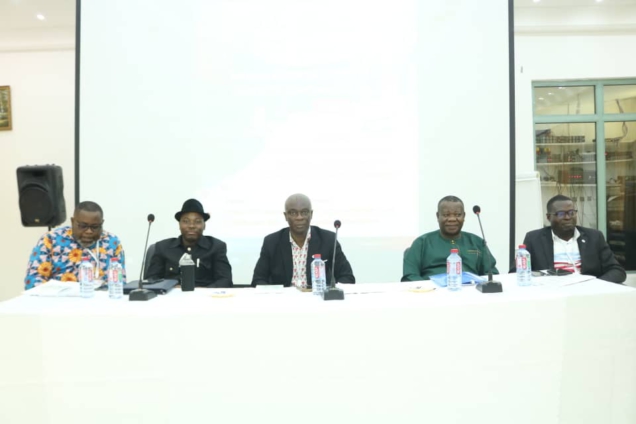Members of the Ghana Society of Radiographers have been urged to develop strategies to harmonise all implementation efforts to help effectively and efficiently carry out their works.
The call was made by the President of the Ghana Society of Radiographers, Dennis Amartey Ahia, during their annual general meeting held at the Holy Trinity Spa and Health Farm in Sogakope in the South Tongu District.
Dennis Amartey Ahia noted that there is the need for collaboration between clinical practitioners and academia to ensure that the future of radiography workforce is well prepared for advancements in the clinical environment.

''I was glad to learn from a research by Benard O. Botwe et al that 64.5% of Ghanaian radiographers agreed that AI technology is the future of radiography with a good rate of 87.4% appreciating that AI would have an overall positive impact on radiography practice,'' he said.
He said that aside these prospects, high equipment cost, lack of knowledge and fear of cyber threats are some factors hindering the implementation of some technologically advanced tools in Ghana adding that human resource, cost, training and infrastructure are the basic challenges they face as the country advances in technology.
Dennis Amartey Ahia noted that lack of regulatory and legal policy frameworks; limited resource availability including unreliable internet connectivity and low expert skill set present even much more challenges.

He said the Ghana Society of Radiographers is calling on the government, specifically the Ministry of Health to draw and implement the National Medical Devices Policy which will address the availability of such expensive equipment, planning for periodic maintenance and repairs, procurement, manufacturing, financing, allocation, human resource development/training, and Medical Devices Information among others.
Dennis Amartey Ahia stated that the continuous advancement in science and technology has increased scientific understanding and influenced the practice of various professions in healthcare, including Radiography.
''The production of radiographs which has changed from removing films in the darkroom under safe light and subjecting it to a chemical developer, fixer, washing, rinsing and finally drying in open air, was replaced with Automatic Film Processor (AFP) by just slotting the film in the automatic processor developed and dried,'' Dennis Amartey Ahia said.
Also, Mr. Ahia acknowledged that technological advancements have improved local tumor control and enhanced patient survival in external beam radiotherapy, which he said, delivers high-dose radiation from an external source to its target within a patient with extreme precision.
This he said has advanced from three-dimensional beam delivery to intensity beam modulation then to volumetric modulated arc therapy.
He noted that techniques such as Image-guided radiotherapy (IGRT) and stereotactic body radiotherapy are methods that have been made possible with advancement in technology.
''A promising advancement is the development of 3D and 4D imaging technology in sonography which provides more detailed and comprehensive sonographs. Elastography have become a game changer reducing long periods that patients would have to wait for biopsy results to just some mere minutes,'' he said.

Chairman for the occasion, former Dean of the School of Allied Health Sciences (UHAS), Professor Eric Ofori, in his remarks, urged the members to seize opportunities available currently to improve on their work and develop themselves to become better radiographers.
The professor noted that there is the urgent need for radiographers to catch up with technological advancements available worldwide to help them compete with their colleagues in other countries
He lamented on the lack of adequate professionals available in the various hospitals, attributing the trend to lack of interest due to low remuneration and other factors.
The Head of Department of the School of Biomedical and Allied Health Sciences (UHAS), Dr. Kofi Kyei Adesi, in his keynote address, stated that radiographers play a crucial role in the healthcare sector and are responsible for the safe and effective use of ionizing and non-ionizing radiation in diagnostic and therapeutic procedures.
Dr. Kofi Kyei Adesi said radiographers work tirelessly to ensure that patients receive accurate diagnoses and effective treatment plans and yet are not really well motivated enough to effectively and efficiently deliver on their work.
He pleaded with government to urgently do something about the situation to motivate radiographers to work effectively.
The special guest of honor, Dr. Eli Kwasi Atikpuin, Registrar of the College of Medicine and Allied Sciences (COSMAS) said that technology provides enormous support in terms of improving patient care and helps in reducing patient waiting time.
He, therefore, urged practitioners to embrace technology, particularly, artificial Intelligence (AI).
He however suggested that there is a need to address the anxiety of radiographers about the technology before implementing it.
Latest Stories
-
CAF WCL 2024: Ghana’s Thelma Baffour wins title with TP Mazembe
22 mins -
Benjamin Boakye slams politicisation of energy sector issues and ECG’s inefficiencies
27 mins -
Erastus Asare Donkor and Dr Neta Parsram win big at 10th Mining Industry Awards
43 mins -
Government is “suppressing information” about power sector challenges – IES Director
50 mins -
Majority of our debts caused by forex shortfall – ECG Boss
1 hour -
Pan-African Savings and Loans supports Ghana Blind Union with boreholes
2 hours -
Bole-Bamboi MP Yussif Sulemana donates to artisans and Bole SHS
2 hours -
Top up your credit to avoid potential disruption – ECG to Nuri meter customers
2 hours -
Dutch & Co wins 2024 Entrepreneur of the Year Award
2 hours -
We’ll cut down imports and boost consumption of local rice and other products – Mahama
5 hours -
Prof Opoku-Agyemang donates to Tamale orphanage to mark her birthday
6 hours -
Don’t call re-painted old schools brand new infrastructure – Prof Opoku-Agyemang tells gov’t
6 hours -
Sunon Asogli plant will be back on stream in a few weeks – ECG
6 hours -
ECOWAS deploys observers for Dec. 7 election
7 hours -
73 officers commissioned into Ghana Armed Forces
7 hours

